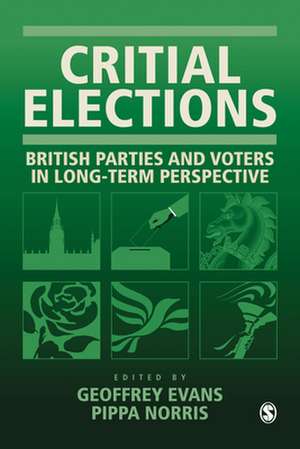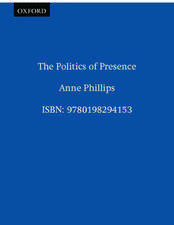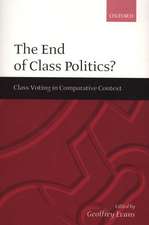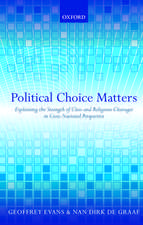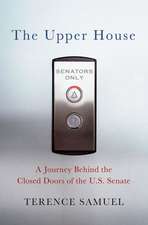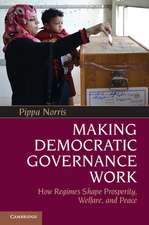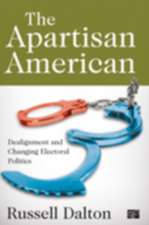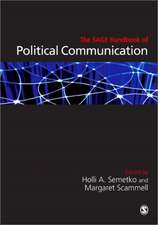Critical Elections: British Parties and Voters in Long-term Perspective
Editat de Geoffrey Evans, Pippa Norrisen Limba Engleză Paperback – 28 apr 1999
| Toate formatele și edițiile | Preț | Express |
|---|---|---|
| Paperback (1) | 503.43 lei 6-8 săpt. | |
| SAGE Publications – 28 apr 1999 | 503.43 lei 6-8 săpt. | |
| Hardback (1) | 1383.46 lei 6-8 săpt. | |
| SAGE Publications – 28 apr 1999 | 1383.46 lei 6-8 săpt. |
Preț: 503.43 lei
Preț vechi: 592.27 lei
-15% Nou
Puncte Express: 755
Preț estimativ în valută:
96.33€ • 100.58$ • 79.73£
96.33€ • 100.58$ • 79.73£
Carte tipărită la comandă
Livrare economică 04-18 aprilie
Preluare comenzi: 021 569.72.76
Specificații
ISBN-13: 9780761960201
ISBN-10: 0761960201
Pagini: 352
Dimensiuni: 156 x 234 x 18 mm
Greutate: 0.53 kg
Ediția:1
Editura: SAGE Publications
Colecția Sage Publications Ltd
Locul publicării:London, United Kingdom
ISBN-10: 0761960201
Pagini: 352
Dimensiuni: 156 x 234 x 18 mm
Greutate: 0.53 kg
Ediția:1
Editura: SAGE Publications
Colecția Sage Publications Ltd
Locul publicării:London, United Kingdom
Recenzii
`A splendid testament to the health and strength of electoral studies in Britain' - EPOP Newsletter
`A splendid collection from Britain's most dynamic psephologists' - David Lipsey, The Economist
`An excellent account of how there came to be a landslide New Labour victory after almost two decades of uninterrupted Conservative Government, with expert analyses on the interrelated themes of party, social influences and issue alignments' - Richard Rose, University of Strathclyde
`Critical Elections assembles the leading scholars of British electoral politics to provide a rich analysis of the forces that propelled Tony Blair and New Labour to victory in 1997. Even more valuable, by placing this election in the context of long-term trends, this book makes an important contribution to the study of British politics and electoral change in modern democracies. While it is yet unclear whether 1997 represents a critical election, it is certain that this book should be considered critical reading for scholars in the field' - Russell Dalton, UC Irvine
`The various chapters provide the latest informtion on, and interpretation of, the key areas of debate among elections specialists - the decline of party identification and class voting, the influence of region, gender, ideology and the European issue on party choice, the causes and consequences of low turnout in 1997, and so on. If there are general lessons to be derived from the wealth of detail presented here, they are, first that it is too soon to say whether 1997 was a critical election - to a large extent it confirmed pre-existing trends - and, second, that voters in 1997 responded to the strategies, tactics and performance of the parties themselves.' - Parliamentary Affairs
`The British election that ushered Tony Blair and the Labour Party to power and handed the Conservative party its biggest defeat since the days of Queen Victoria serves as a laboratory for the communication scholars and political scientists who authored these companion books. They put this stunning election under the microscope to see what it can tell us about relationships between voters and parties and the ways media and modern campaign techniques influence election outcomes.' - International Journal of Public Opinion Research
`In many ways this is an impressive book. The various chapters are well organised and the book contains a wealth of comprehensible and well executed empirical analysis. Moreover, its overall organization is also impressive. The conceptual framework is adhered to throughout and is discussed consistently in the various chapter conclusions. Given that most researchers tend to have their own theories and research interests, one can only speculate that the editors must have played an active and effective role.' - Party Politics
`This study is not only a 'must' for those interested in contemporary British politics, it is also highly recommendable for those studying parties and voters in other countries.' - Acta Politica
`Edited by two of the most active and innovative figures in Bitish election studies, Geoffrey Evans and Pippa Norris, one can anticipate a consistently high standard of analysis and rigorous empirical evidence, and the reader will not be disappointed. In fact this is an essential text which will become a standard reference work in the field' - Democratization
`Scholars working on electoral politics in other democracies or in comparative perspective may read the Evans/Norris volume as a model of state of the art analytical reasoning and statsistcal technique that should be bought to bear on the field as a whole' - West European Politics
`A splendid collection from Britain's most dynamic psephologists' - David Lipsey, The Economist
`An excellent account of how there came to be a landslide New Labour victory after almost two decades of uninterrupted Conservative Government, with expert analyses on the interrelated themes of party, social influences and issue alignments' - Richard Rose, University of Strathclyde
`Critical Elections assembles the leading scholars of British electoral politics to provide a rich analysis of the forces that propelled Tony Blair and New Labour to victory in 1997. Even more valuable, by placing this election in the context of long-term trends, this book makes an important contribution to the study of British politics and electoral change in modern democracies. While it is yet unclear whether 1997 represents a critical election, it is certain that this book should be considered critical reading for scholars in the field' - Russell Dalton, UC Irvine
`The various chapters provide the latest informtion on, and interpretation of, the key areas of debate among elections specialists - the decline of party identification and class voting, the influence of region, gender, ideology and the European issue on party choice, the causes and consequences of low turnout in 1997, and so on. If there are general lessons to be derived from the wealth of detail presented here, they are, first that it is too soon to say whether 1997 was a critical election - to a large extent it confirmed pre-existing trends - and, second, that voters in 1997 responded to the strategies, tactics and performance of the parties themselves.' - Parliamentary Affairs
`The British election that ushered Tony Blair and the Labour Party to power and handed the Conservative party its biggest defeat since the days of Queen Victoria serves as a laboratory for the communication scholars and political scientists who authored these companion books. They put this stunning election under the microscope to see what it can tell us about relationships between voters and parties and the ways media and modern campaign techniques influence election outcomes.' - International Journal of Public Opinion Research
`In many ways this is an impressive book. The various chapters are well organised and the book contains a wealth of comprehensible and well executed empirical analysis. Moreover, its overall organization is also impressive. The conceptual framework is adhered to throughout and is discussed consistently in the various chapter conclusions. Given that most researchers tend to have their own theories and research interests, one can only speculate that the editors must have played an active and effective role.' - Party Politics
`This study is not only a 'must' for those interested in contemporary British politics, it is also highly recommendable for those studying parties and voters in other countries.' - Acta Politica
`Edited by two of the most active and innovative figures in Bitish election studies, Geoffrey Evans and Pippa Norris, one can anticipate a consistently high standard of analysis and rigorous empirical evidence, and the reader will not be disappointed. In fact this is an essential text which will become a standard reference work in the field' - Democratization
`Scholars working on electoral politics in other democracies or in comparative perspective may read the Evans/Norris volume as a model of state of the art analytical reasoning and statsistcal technique that should be bought to bear on the field as a whole' - West European Politics
Cuprins
Introduction - Pippa Norris and Geoffrey Evans
Understanding Electoral Change
PART ONE: NEW PATTERNS OF PARTY COMPETITION?
Party Policy and Ideology - Ian Budge
Reversing the 1950s?
New Politicians? Changes in Party Competition at Westminster - Pippa Norris
Party Members and Ideological Change - Paul Webb and David M Farrell
Party Loyalties - Ivor Crewe and Katarina Thomson
Dealignment or Realignment?
PART TWO: NEW SOCIAL ALIGNMENTS?
Class - Geoffrey Evans, Anthony Heath and Clive Payne
Labour as a Catch-All Party?
Race - Shamit Saggar and Anthony Heath
Towards a Multicultural Electorate?
Region - John Curtice and Alison Park
New Labour, New Geography?
Gender - Pippa Norris
A Gender-Generation Gap?
New Sources of Abstention? - Anthony Heath and Bridget Taylor
PART THREE: NEW ISSUE ALIGNMENTS?
The Impact of Left-Right Ideology - David Sanders
Europe - Geoffrey Evans
A New Electoral Cleavage?
Scotland - Paula Surridge et al
Constitutional Preferences and Voting Behaviour
Dynamic Representation in Britain - Mark Franklin and Christina Hughes
Conclusion - Pippa Norris and Geoffrey Evans
Was 1997 a Critical Election?
Understanding Electoral Change
PART ONE: NEW PATTERNS OF PARTY COMPETITION?
Party Policy and Ideology - Ian Budge
Reversing the 1950s?
New Politicians? Changes in Party Competition at Westminster - Pippa Norris
Party Members and Ideological Change - Paul Webb and David M Farrell
Party Loyalties - Ivor Crewe and Katarina Thomson
Dealignment or Realignment?
PART TWO: NEW SOCIAL ALIGNMENTS?
Class - Geoffrey Evans, Anthony Heath and Clive Payne
Labour as a Catch-All Party?
Race - Shamit Saggar and Anthony Heath
Towards a Multicultural Electorate?
Region - John Curtice and Alison Park
New Labour, New Geography?
Gender - Pippa Norris
A Gender-Generation Gap?
New Sources of Abstention? - Anthony Heath and Bridget Taylor
PART THREE: NEW ISSUE ALIGNMENTS?
The Impact of Left-Right Ideology - David Sanders
Europe - Geoffrey Evans
A New Electoral Cleavage?
Scotland - Paula Surridge et al
Constitutional Preferences and Voting Behaviour
Dynamic Representation in Britain - Mark Franklin and Christina Hughes
Conclusion - Pippa Norris and Geoffrey Evans
Was 1997 a Critical Election?
Descriere
`An excellent account of how there came to be a landslide New Labour victory after almost two decades of uninterrupted Conservative Government, with expert analyses on the interrelated themes of party, social influences and issue alignments' - Richard Rose, University of Strathclyde
Did Labour's landslide victory in 1997 mark a critical watershed in British party politics? Did the radical break with 18 years of Conservative rule reflect a fundamental change in the social and ideological basis of British voting behaviour? Critical Elections brings together leading scholars of parties, elections and voting behaviour to provide the first systematic overview of long-term change in British electoral politics.
Did Labour's landslide victory in 1997 mark a critical watershed in British party politics? Did the radical break with 18 years of Conservative rule reflect a fundamental change in the social and ideological basis of British voting behaviour? Critical Elections brings together leading scholars of parties, elections and voting behaviour to provide the first systematic overview of long-term change in British electoral politics.
